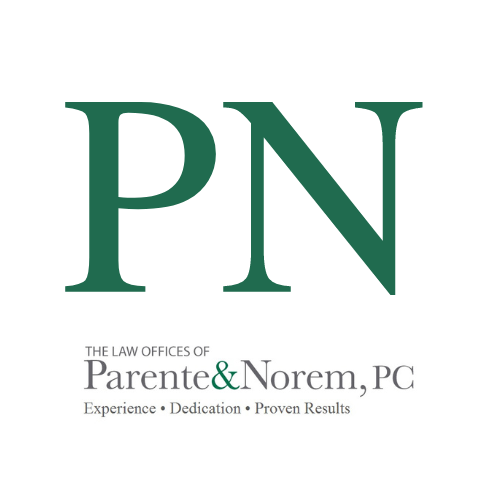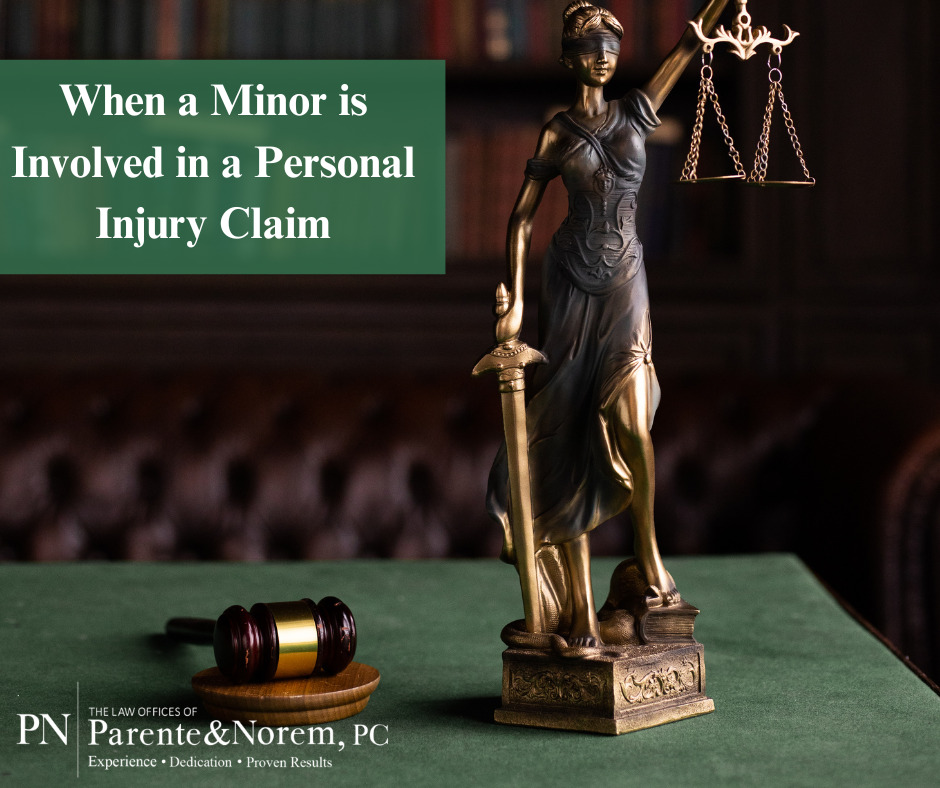
P&N BLOG | When a Minor is Involved in a Personal Injury Claim
When a child is injured because of someone else’s negligence, the path to justice is more complex than it is for adult victims. Special legal safeguards are in place to ensure a child’s rights and best interests are fully protected throughout the claims process. Whether the injury stems from a car accident, a slip-and-fall, or medical malpractice, it’s essential for families to understand how these cases work.
In today’s blog, we’re breaking down what parents and guardians need to know when pursuing a personal injury claim on behalf of a minor.
Who Can File a Personal Injury Claim for a Minor?
Because minors (anyone under 18) cannot legally represent themselves, a parent or legal guardian must file the claim on their behalf. In some situations, a guardian ad litem—a neutral third party—may be appointed by the court to represent the child’s best interests, especially if there’s a potential conflict of interest (for example, if a parent may be partially at fault).
While parents or guardians lead the legal process, any compensation awarded belongs solely to the child and is meant to cover injury related costs like medical expenses, emotional suffering, and future losses.
Understanding the Statute of Limitations
The statute of limitations sets the time limit for filing a claim, but when a child is involved, the rules often differ. In many states, the countdown doesn’t begin until the child turns 18. However, exceptions can apply depending on the type of case, the defendant, and state-specific laws.
To avoid missing critical deadlines, it’s crucial to consult a personal injury attorney as soon as possible after the injury occurs.
How Compensation is Managed for Minors
When a personal injury claim involving a minor results in a settlement, the court closely oversees how the funds are handled. In most cases, the money is placed in a trust, structured settlement, or a blocked bank account; only accessible when the child turns 18.
This added layer of protection ensures the compensation is used appropriately, such as for ongoing medical care, therapy, or education, and prevents misuse by others.
Court Involvement in Minor Settlements
Courts take an active role in cases involving injured minors. If a settlement is reached, a judge will typically hold a minor settlement hearing to review the terms and make sure the agreement is fair and in the child’s best interest.
During the hearing, the judge will consider the nature of the injury, the amount of the settlement, and any future care the child may require before granting approval.
Types of Compensation Available
Damages in a personal injury case involving a child can include:
- Medical Expenses: Covers both immediate and long-term care needs.
- Pain and Suffering: For the physical and emotional impact of the injury.
- Loss of Future Earnings: If the injury will affect the child’s ability to work later in life.
- Parental Loss of Income: In some cases, parents may be compensated for time taken off work to care for their injured child.
Should You Settle or Go to Trial?
Most personal injury claims involving children are resolved through settlement rather than going to court. Settlements can provide quicker resolutions and help avoid the emotional and financial stress of a trial. That said, the decision depends on the strength of the case, the offer on the table, and whether the settlement adequately addresses the child’s future needs.
If a settlement is reached, it must be approved by the court to ensure it truly serves the child’s best interest.
Why You Need an Experienced Personal Injury Attorney
Given the additional rules and oversight involved in minor injury claims, working with a knowledgeable personal injury attorney is key. An attorney will:
- Navigate legal procedures
- Handle negotiations with insurance companies
- Represent the child’s best interests in court
- Ensure all local and state requirements are met
From filing the claim to managing court approval and financial planning, an experienced attorney can help you avoid common pitfalls and secure the best outcome for your child.
Your Child Deserves Justice And So Do You
If your child has been injured due to someone else’s negligence, don’t go through this process alone. Contact The Law Offices of Parente & Norem, P.C. today at 312.641.5926 for a free consultation with one of our skilled personal injury attorneys. We’ll walk with you every step of the way because your child deserves the best care, support, and compensation possible.
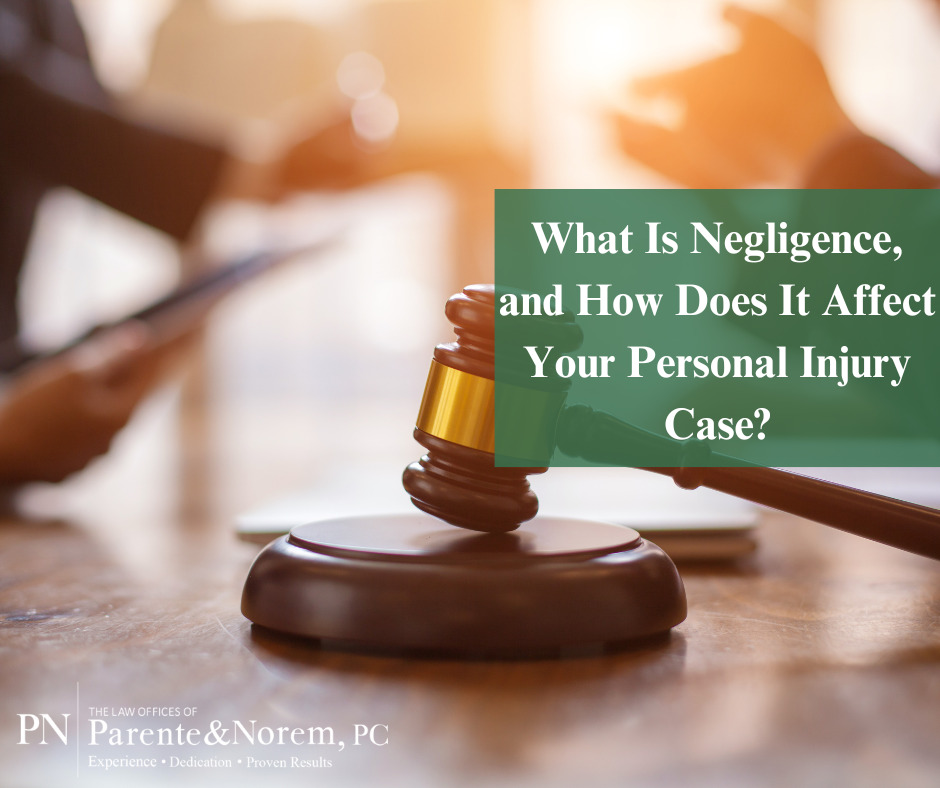
P&N BLOG | What Is Negligence, and How Does It Affect Your Personal Injury Case?
When it comes to personal injury law, negligence is one of the most important concepts to understand. In fact, it’s the foundation of most personal injury claims. If you’ve been injured due to someone else’s carelessness, understanding what negligence means, and how to prove it, can make all the difference in securing the compensation you deserve.
Let’s break it down: what negligence really is, how it’s proven, and how it impacts your personal injury case.
What Is Negligence?
In legal terms, negligence is the failure to act with the level of care that a reasonably prudent person would under similar circumstances. When someone’s carelessness causes harm to another person, they can be held legally responsible for their actions or inactions.
Think of it this way, if someone had a duty to act carefully and they didn’t, and their carelessness led to your injury, you may have a valid claim for negligence.
The 3 Key Elements of a Negligence Claim
To successfully prove negligence in a personal injury case, there are three core elements you and your attorney need to establish:
Duty of Care
You must first show that the person or entity who caused your injury had a legal duty to act with reasonable care. This duty can arise from everyday situations (like drivers having a duty to follow traffic laws) or more specific relationships (like a business owner’s responsibility to maintain safe premises).
Breach of Duty
Next, you’ll need to prove that the person breached that duty; meaning they failed to act with the level of care that was legally expected. This could be a driver texting while driving, a property owner ignoring a hazardous condition, or a professional failing to meet industry standards.
Causation
Lastly, there must be a direct link between the person’s breach of duty and your injury. In other words, you need to prove that your injury wouldn’t have occurred if it weren’t for the other person’s negligence.
Proving Each Element of Negligence
Duty of Care
The law generally requires people to act with “reasonable care” in situations where their actions could affect others. For example, drivers are expected to obey traffic laws and operate their vehicles safely. Certain scenarios, like medical malpractice or common carrier cases, may involve a higher or specialized duty of care.
Breach of Duty
Proving a breach isn’t always straightforward. Courts often look at what a reasonable person would have done in the same situation. If the defendant’s actions fell short of that standard, it may be considered a breach. In more technical cases, expert witnesses may be brought in to assess whether professional standards were violated.
Causation
You’ll need to demonstrate that your injury was directly caused by the defendant’s actions. Would you still have been injured if the person had acted with reasonable care? If the answer is no, causation is likely established. Some cases require detailed medical or expert testimony to make that link clear.
How Negligence Impacts Your Compensation
Negligence doesn’t just help prove who was at fault, it also plays a huge role in determining how much compensation you may receive. Here’s what factors into that:
- Duration of the Injury: Longer recovery times often lead to higher compensation.
- Permanent or Long-Term Effects: If your injuries result in lasting impairments, that increases the value of your claim.
- Medical Costs: Past, current, and future medical expenses—including surgeries, rehab, and medications are all considered.
- Lost Wages: If you’ve had to miss work or can no longer earn at the same level, you may be entitled to compensation for lost income or reduced earning capacity.
Taking Action After an Injury
Negligence isn’t just a legal term, it’s about accountability. When someone’s careless behavior causes harm, the law provides a path for victims to seek justice and financial recovery.
If you or someone you love has been injured due to another person’s negligence, don’t navigate the legal process alone. The first step is speaking with an experienced personal injury attorney who can evaluate your case and help you understand your rights.
Contact The Law Offices of Parente & Norem, P.C. today at 312.641.5926 for a free consultation with one of our experienced trial attorneys, or fill out a contact form right here on our website. We’re here to fight for the compensation and justice you deserve.
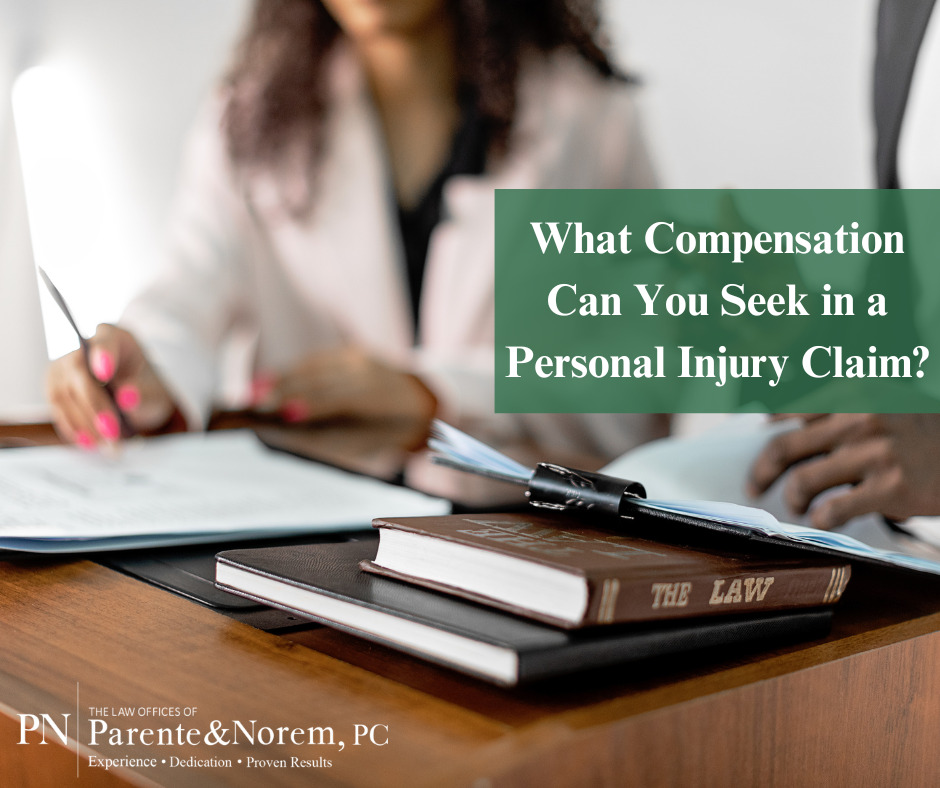
P&N BLOG | What Compensation Can You Seek in a Personal Injury Claim?
If you’ve been injured due to someone else’s negligence or wrongful actions, understanding your rights and the compensation available is essential. Personal injury laws exist to ensure that victims can recover damages for their losses, whether financial, emotional, or otherwise. In this post, we’ll break down the different types of compensation you may be entitled to, including economic and non-economic damages, punitive damages, and wrongful death damages. We’ll also discuss limitations on injury compensation and how you can maximize your claim.
Types of Personal Injury Compensation
Economic Damages
Economic damages cover tangible financial losses resulting from an injury. These are relatively straightforward to calculate and may include:
- Medical Bills: Reimbursement for hospital stays, surgeries, medication, rehabilitation, and other medical expenses related to your injury.
- Future Medical Costs: Compensation for ongoing or long-term medical care required due to permanent injuries.
- Lost Wages: Coverage for income lost while recovering from the injury.
- Future Lost Earnings: If your ability to work is permanently affected, you may be compensated for the income you would have earned.
- Property Damage: Reimbursement for any personal property damaged in the incident.
- Other Out-of-Pocket Expenses: Any additional costs incurred due to the accident, such as transportation for medical appointments.
Estimating these damages involves reviewing medical records, employment history, and expert opinions on future financial impact.
Non-Economic Damages
Non-economic damages account for losses that do not have a direct financial value but significantly impact your quality of life. These may include:
- Pain and Suffering: Compensation for the physical pain and discomfort endured due to the injury.
- Emotional Distress: Coverage for psychological trauma, such as anxiety, depression, or PTSD, resulting from the accident.
- Loss of Consortium: Compensation for the loss of companionship, intimacy, or support from a spouse or family member.
- Disfigurement: Damages awarded for permanent scarring or disfigurement caused by the injury.
- Loss of Enjoyment of Life: Compensation for the inability to participate in activities that once brought joy.
Punitive Damages
Punitive damages are awarded in cases where the defendant’s conduct was more than just negligent—it was reckless or intentionally harmful. Unlike economic and non-economic damages, punitive damages are not meant to compensate the victim but rather to punish the wrongdoer and deter similar behavior in the future. The amount awarded depends on the severity of the misconduct.
Wrongful Death Damages
If a loved one has died due to someone else’s negligence, their estate or family members may be entitled to wrongful death damages, which can include:
- Medical expenses incurred before death
- Pain and suffering experienced before death
- Funeral and burial expenses
- Loss of financial support the deceased would have provided
- Emotional distress and mental anguish experienced by surviving family members
- Loss of consortium (companionship and support provided by the deceased)
Limitations on Injury Compensation
While personal injury compensation is designed to provide full recovery, some legal and practical limitations may apply:
Tort Reform Limits
Some states have laws that cap the amount of compensation victims can receive, especially for non-economic and punitive damages. These limits are most common in medical malpractice cases and other specific claims.
Insurance Policy Limits
Most injury claims are paid through insurance policies, which have coverage limits. If your damages exceed the defendant’s policy limits, you may have difficulty collecting the remaining amount directly from the responsible party.
Seeking the Compensation You Deserve
Personal injury claims can be complex, involving multiple categories of damages and legal considerations. To ensure you receive fair compensation, it’s crucial to work with an experienced personal injury attorney who can guide you through settlement negotiations or court proceedings.
If you or a loved one has suffered an injury due to another’s negligence, The Law Offices of Parente & Norem, P.C. can help. Call or text us today for a free case evaluation at 312.641.5926, or fill out a contact form on our website.
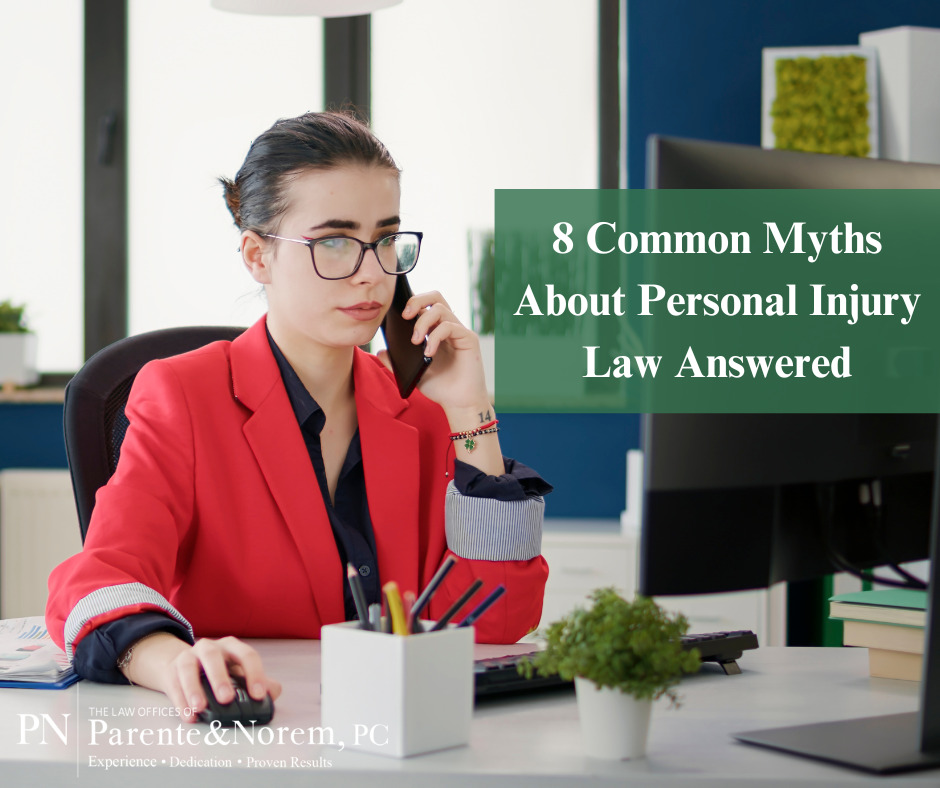
P&N BLOG | 8 Common Myths About Personal Injury Law Answered
When you’re injured due to someone else’s negligence, navigating the legal process can feel overwhelming. Unfortunately, many people shy away from filing a personal injury claim because of common misconceptions. These myths often prevent victims from seeking the compensation they rightfully deserve.
At The Law Offices of Parente & Norem, P.C., we believe in empowering injury victims with accurate information. That’s why we’re debunking some of the most common myths about personal injury law in Illinois. This way, you can make informed decisions if you ever find yourself in this situation.
Myth #1: Minor Injuries Aren’t Worth a Personal Injury Claim
Fact: Even seemingly minor injuries can have long-term consequences. Some injuries don’t show symptoms right away but worsen over time. Seeking medical attention is crucial, and filing a claim ensures you receive proper compensation for any future complications.
Myth #2: If You Have Insurance, You Don’t Need a Lawyer
Fact: Insurance companies are businesses, and they aim to pay out as little as possible. They may offer low settlements that don’t cover your full expenses. A personal injury lawyer will advocate for your rights and help you get the compensation you truly deserve.
Myth #3: You Can File a Personal Injury Case Anytime
Fact: Illinois has a statute of limitations for personal injury cases. If you wait too long, you could lose your right to seek compensation. Additionally, filing sooner helps preserve evidence and witness testimonies that may weaken over time.
Myth #4: Filing a Lawsuit Will Ruin Someone’s Life
Fact: Many people hesitate to file claims against friends, family members, or employers. However, in most cases, insurance companies, not individuals, pay settlements. Your focus should be on your recovery, not on protecting the responsible party from financial consequences.
Myth #5: Personal Injury Claims Are Only for “Greedy” People
Fact: Seeking compensation is about fairness, not greed. Medical bills, lost wages, rehabilitation costs, and emotional distress add up quickly. A personal injury claim ensures that you’re not left shouldering these burdens alone.
Myth #6: Compensation Is Guaranteed
Fact: While many personal injury cases settle, compensation is never guaranteed. Every case is unique, and the amount you receive depends on factors like evidence, liability, and the skill of your attorney.
Myth #7: Holding Out Longer Leads to a Bigger Settlement
Fact: A skilled attorney can negotiate a fair settlement without unnecessary delays. Waiting too long without legal strategy could weaken your case, especially if key evidence deteriorates.
Myth #8: Personal Injury Cases Are Overloading the Courts
Fact: Contrary to popular belief, personal injury cases make up only a small percentage of civil court cases. In fact, the number of cases has declined in recent years.
Know Your Rights & Don’t Let Myths Hold You Back
If you’ve been injured due to someone else’s negligence, pursuing a personal injury claim is not only your right but often a necessity for your financial and physical recovery. Having the right legal team on your side can make all the difference.
At The Law Offices of Parente & Norem, P.C., we fight for injury victims and win big cases. Call us today at 312-641-5926 for a free consultation because you deserve justice and fair compensation.
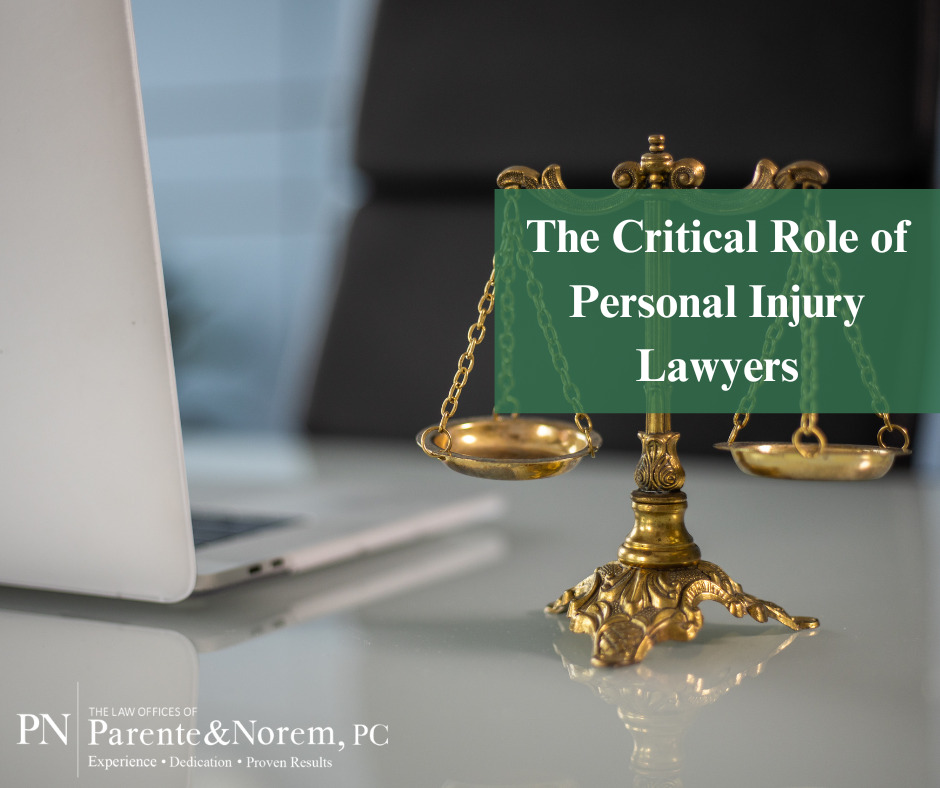
P&N BLOG | The Critical Role of Personal Injury Lawyers
Accidents can occur unexpectedly, leaving victims with physical injuries, emotional distress, and financial burdens. Victims have the right to seek compensation for their losses when these incidents are caused by someone else’s negligence or wrongful actions. Personal injury attorneys are legal professionals who specialize in representing individuals who have suffered harm due to another party’s negligence. Their primary mission is to secure fair compensation for their clients, covering medical expenses, lost wages, pain and suffering, and other damages.
Specialized Knowledge and Expertise
What sets personal injury attorneys apart is their deep understanding of personal injury law. They possess extensive knowledge of relevant statutes, legal precedents, and procedural rules that can influence the outcome of a case. Their specialized training allows them to navigate complex claims, ensuring that victims receive the compensation they are entitled to under the law.
Investigating and Strengthening Claims
A significant part of a personal injury attorney’s job involves conducting thorough investigations into the circumstances surrounding an accident. This includes:
- Gathering evidence such as medical records, accident reports, and witness statements.
- Consulting with experts in fields like medicine, accident reconstruction, and economics to establish the full extent of damages.
- Analyzing the accident scene and any available surveillance footage to support the case. By building a strong, evidence-backed claim, attorneys enhance their clients’ chances of obtaining maximum compensation.
Dealing with Insurance Companies
Insurance companies often try to minimize payouts, using various tactics to undervalue claims or deny them altogether. Personal injury attorneys have extensive experience negotiating with insurance adjusters and are well-versed in these tactics. By having a lawyer handle the negotiations, victims can avoid being pressured into accepting unfair settlements and can instead focus on recovery while their attorney fights for their best interests.
Litigation and Court Representation
While many personal injury cases are resolved through settlements, some disputes require litigation. If negotiations fail to yield a fair outcome, an experienced personal injury attorney will not hesitate to take the case to court. In trial settings, they present compelling arguments before a judge and jury, using evidence and expert testimony to advocate for their clients.
Why Legal Representation Matters
The aftermath of an accident can be overwhelming, and navigating legal procedures without professional guidance can be daunting. Personal injury attorneys provide crucial support by:
- Protecting victims from unfair settlement offers.
- Ensuring all legal deadlines are met.
- Providing knowledgeable advice every step of the way.
- Offering peace of mind by handling all legal aspects of the case.
If you or a loved one have been injured due to someone else’s negligence, seeking legal assistance can make all the difference. Call or text The Law Offices of Parente & Norem, P.C. today at 312.641.5926 or fill out a contact form on our website to schedule a consultation. Let our experienced attorneys fight for the compensation and justice you deserve.
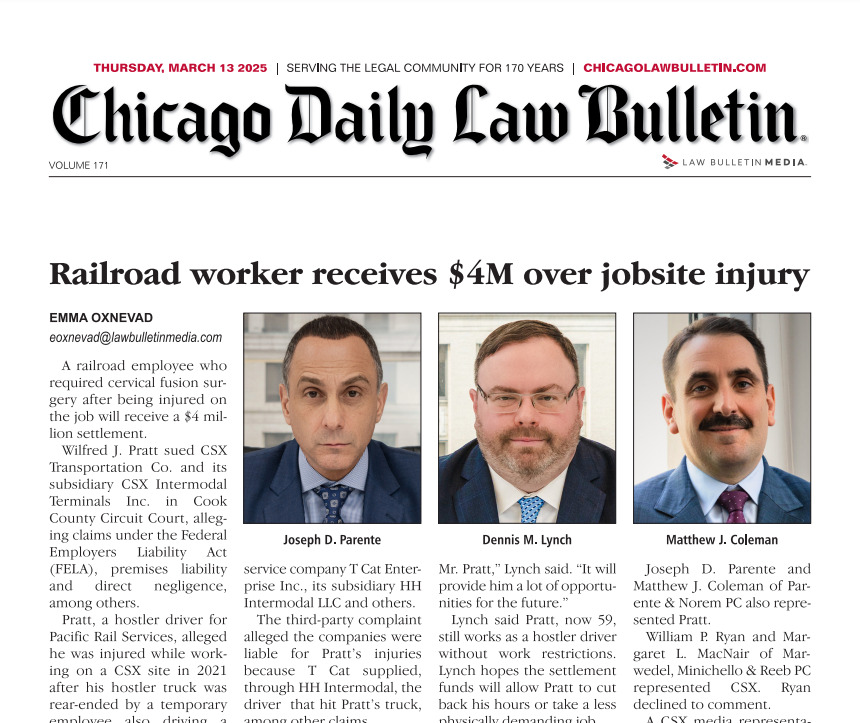
Railroad Worker Wins $4 Million Settlement After Workplace Injury
A railroad worker has secured a $4 million settlement following a serious workplace injury that required extensive surgery. The worker, a hostler driver for Pacific Rail Services, filed a lawsuit against a major transportation company and its subsidiary, citing unsafe work conditions and negligence under the Federal Employers Liability Act (FELA).
The injury occurred in 2021 when the worker’s hostler truck was rear-ended by a temporary employee operating another hostler truck at a company site. The lawsuit alleged that the company failed to enforce safety protocols and did not provide adequate safeguards to prevent such incidents. In response, the defendants filed a third-party complaint against the labor service provider that supplied the temporary driver, arguing that they were also responsible for the worker’s injuries.
As a result of the accident, the worker suffered a herniated disc and nerve damage in the neck, ultimately requiring a three-level cervical fusion surgery. Despite the severity of his injuries, he continues to work without restrictions. However, his legal team hopes the settlement will offer him financial flexibility, allowing him to reduce his workload or transition to a less physically demanding role.
The settlement was finalized on March 4 2025, with all involved parties reaching an agreement. The case was mediated, and a judge officially dismissed the lawsuit shortly after. Trial attorneys Joseph D. Parente, Dennis M. Lynch, and Matthew J. Coleman represented the worker and expressed satisfaction with the outcome, emphasizing that the compensation will provide significant opportunities for his future.
This case highlights the importance of workplace safety and accountability, particularly in industries where employees face high risks of injury. It serves as a reminder that workers have legal recourse when employers fail to uphold safety standards.

P&N BLOG | The Importance of Adequate Auto Insurance Policies in Personal Injury Cases in Illinois
Car accidents are unpredictable and can happen to anyone at any time. The consequences can range from minor inconveniences to severe, life-altering injuries that require ongoing medical care. In these situations, the auto insurance policies you carry play a crucial role in determining the compensation available for your injuries and damages. In Illinois, having sufficient auto insurance coverage is not just a legal requirement; it’s a necessity for financial protection.
Why Auto Insurance Policies Matter
Auto insurance serves as a financial safety net, covering damages and injuries sustained in accidents. It ensures that injured parties receive compensation for medical expenses, lost wages, pain and suffering, and other economic and non-economic losses. Without adequate coverage, accident victims may face significant financial burdens that could impact their lives for years to come.
Understanding Illinois Auto Insurance Laws
Illinois law mandates that all drivers carry basic auto insurance coverage, known as the 25/50/20 minimum liability limits. This means that if an insured driver causes an accident, their insurance provider will cover:
- Up to $25,000 for bodily injury per person
- Up to $50,000 for total bodily injury per accident
- Up to $20,000 for property damage
While these minimums are legally required, they may not be sufficient to cover all expenses resulting from a serious accident. Medical bills, vehicle repairs, and lost wages can quickly exceed these limits, leaving drivers financially vulnerable.
The Need for Adequate Auto Insurance Coverage
Personal injury claims in Illinois are typically filed against the at-fault driver’s insurance. If the at-fault driver’s coverage is insufficient, victims may struggle to recover the full extent of their damages. To avoid financial hardship, it is advisable to carry higher-limit insurance policies that provide broader protection.
Additionally, drivers should consider purchasing uninsured/underinsured motorist coverage. This type of coverage protects you if you are involved in an accident with a driver who either lacks insurance or does not have enough coverage to pay for your damages. Having this extra layer of protection can mean the difference between financial stability and significant out-of-pocket expenses following an accident.
Auto insurance is a critical tool for mitigating the financial risks associated with car accidents. In Illinois, personal injury claimants depend primarily on the at-fault driver’s insurance for compensation, making it essential to have adequate coverage. By opting for high-limit policies and supplemental protections such as uninsured/underinsured motorist coverage, drivers can safeguard themselves against unexpected financial burdens. Investing in comprehensive auto insurance provides not only legal compliance but also peace of mind, ensuring that you are fully protected whenever you’re on the road.

P&N BLOG | Why It Is Crucial To Seek Medical Attention After an Accident
Car accidents are often overwhelming experiences, leaving victims unsure of what steps to take next. After a collision, it might be tempting to brush off minor discomfort or assume you’re unharmed. However, seeking immediate medical attention is essential, even if you feel fine. This crucial step can protect both your health and your potential personal injury claim. Let’s explore the reasons why prompt medical care is necessary after a car accident in Illinois.
The Hidden Dangers of Delayed Symptoms
The body’s natural response to trauma includes a surge of adrenaline, which can temporarily mask pain and injuries. As a result, many car accident injuries do not present immediate symptoms. Headaches, dizziness, neck or back pain, and numbness in extremities are all signs that may appear hours, days, or even weeks later. Ignoring these symptoms can lead to serious complications and prolonged recovery times.
For example, dizziness following an accident may indicate a concussion or whiplash. Seeking medical evaluation right away ensures that any underlying injuries are diagnosed early, allowing for timely and effective treatment.
Protecting Your Right to Compensation
If you plan to file a personal injury claim, obtaining medical care as soon as possible is important. Illinois law imposes a statute of limitations on personal injury cases, meaning there is a limited time to file a claim. Delaying medical treatment can weaken your case by making it harder to connect your injuries directly to the accident.
Medical records serve as vital evidence in personal injury claims, demonstrating the extent of your injuries and the treatment received. Insurance companies often scrutinize gaps in medical treatment, using them to argue that injuries were unrelated to the accident or not severe enough to warrant compensation. Seeking medical care promptly helps counter these tactics and strengthens your claim.
Establishing Causation and Damages
Receiving immediate medical attention also helps create a clear timeline of events, making it easier to prove that your injuries were caused by the accident. A comprehensive medical evaluation can uncover less visible injuries, such as internal damage or soft tissue injuries, which may not be immediately apparent but can have serious long-term effects.
Having thorough medical documentation is key to pursuing compensation for medical expenses, lost wages, and pain and suffering. The sooner you seek treatment, the stronger your claim will be.
Preventing Long Term Health Consequences
Failing to address injuries right away can lead to chronic conditions, reduced mobility, and ongoing pain. For example, concussions and other head injuries might not show immediate symptoms but can cause significant cognitive and physical issues if left untreated.
Additionally, some injuries require early intervention for the best possible recovery. Seeking prompt medical care ensures that you receive the necessary treatment, helping to prevent further complications and long-term health challenges.
Meeting the Legal Duty to Mitigate Damages
Under Illinois law, personal injury victims have a “duty to mitigate” damages, meaning they must take reasonable steps to minimize the impact of their injuries. Seeking medical treatment promptly is a fundamental part of fulfilling this legal obligation.
Failure to seek timely medical attention can result in reduced compensation. Insurance companies and courts may argue that any worsening of your condition is due to your own negligence, limiting the damages you can recover. By prioritizing medical care, you protect your legal rights and improve your chances of receiving fair compensation.
Take Action to Protect Your Health and Legal Rights
Seeking immediate medical attention after a car accident is essential for both your health and any potential legal claims. It ensures that hidden injuries are diagnosed and treated early, prevents long-term complications, and strengthens your case for compensation.
Your wellbeing should always come first. If you or a loved one has been injured in an accident, don’t delay in seeking medical care. Additionally, consulting with a personal injury attorney can help you understand your rights and navigate the legal process effectively.
For a free case evaluation, contact The Law Offices of Parente & Norem, P.C. today at 312.641.5926 or fill out a contact form on our website. Our experienced attorneys are here to help you every step of the way.
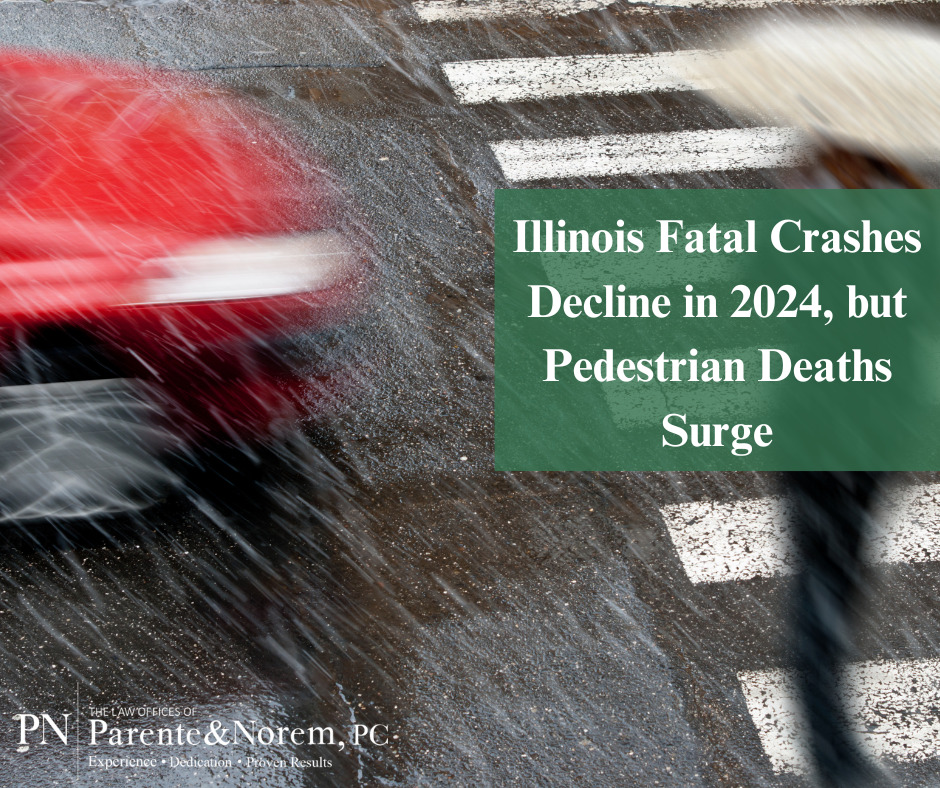
P&N BLOG | Illinois Fatal Crashes Decline in 2024, but Pedestrian Deaths Surge
New data from the Illinois Department of Transportation (IDOT) offers a mixed bag of news regarding traffic safety in Illinois. While fatal vehicle crashes in 2024 fell to their lowest levels since 2020, the number of pedestrian fatalities remains alarmingly high.
Encouraging Trends in Fatal Vehicle Crashes
In 2024, IDOT reported 1,103 fatal traffic crashes across Illinois, resulting in 1,196 deaths. These figures mark a 3.5% decline compared to 2023. Additionally, there were significant decreases in specific types of crashes:
- Cyclist fatalities: Dropped from 41 in 2023 to 35 in 2024, a 14.6% decrease, though still above the seven-year average of 30.
- Work zone fatalities: Plummeted from 24 in 2023 to just 13 in 2024.
- Motorcycle-related deaths: Fell by 9.3%, from 162 in 2023 to 147 last year.
These declines suggest progress in areas such as work zone safety and awareness campaigns targeting motorcyclists and cyclists.
The Persistent Problem of Pedestrian Deaths
While overall fatalities have decreased, pedestrian deaths have surged, highlighting a critical issue in Illinois traffic safety. In 2024, 219 pedestrians lost their lives in crashes, a 9.5% increase from the 200 fatalities recorded in 2023.
The six-county region of Cook, DuPage, Kane, Lake, McHenry, and Will counties saw 144 pedestrian fatalities in 2024, up 6.7% from 135 the previous year. This rise mirrors a national trend that has been ongoing for over a decade. “Since 2010, there has been nationally a huge increase in the number of people killed while walking,” said Victoria Barrett, Senior Transportation Planner at the Chicago Metropolitan Agency for Planning (CMAP).
Why Are Pedestrian Fatalities Increasing?
Several factors contribute to the rise in pedestrian deaths:
Vehicle Design: Research by the Insurance Institute for Highway Safety reveals that larger vehicles like SUVs, pickups, and vans with taller hood heights are significantly more likely to cause fatal injuries to pedestrians. Unlike sedans, which tend to strike a pedestrian’s legs, larger vehicles often hit the torso or head, where vital organs are located.
Distracted Driving and Speeding: Both Barrett and Alex Perez, Advocacy Manager at the Active Transportation Alliance, note that distracted driving and pandemic-era speeding habits remain major contributors to collisions. Reduced traffic enforcement has exacerbated these issues.
Street Design: Suburban roads like North Avenue, characterized by fast-moving traffic and multiple lanes, are especially hazardous for pedestrians and cyclists.
Long-Term Trends: Professor Ian Savage from Northwestern University points out that pedestrian and cyclist fatalities have made up an increasing proportion of total traffic deaths in Illinois since the pandemic, rising from 18.3% in 2019 to 21.2% in 2024.
Efforts to Improve Safety for Vulnerable Road Users
State and local authorities are taking action to address these alarming trends. Here are some of the ongoing initiatives:
- IDOT’s Vulnerable Road User Safety Assessment: This recently completed report identifies high-risk areas and crash trends to prioritize safety for pedestrians and cyclists.
- Safe Travel for All Program: CMAP is working with Cook and neighboring counties to develop strategies aimed at reducing traffic deaths and injuries. An open house for the program will be held on February 22 at the Centre of Elgin.
- Increased Focus on Pedestrian Safety: “One fatality is one too many,” said IDOT Communications Director Guy Tridgell. The department is investing more time and resources into identifying tools and policies that improve safety for vulnerable road users.
The Road Ahead
While progress has been made in reducing overall fatal crashes, the rise in pedestrian deaths underscores the urgent need for further action. Enhanced vehicle design standards, stricter traffic enforcement, and improved road infrastructure could all play a role in reversing this trend. For pedestrians and cyclists, safety on Illinois roads remains a pressing concern that requires attention from policymakers, drivers, and communities alike.
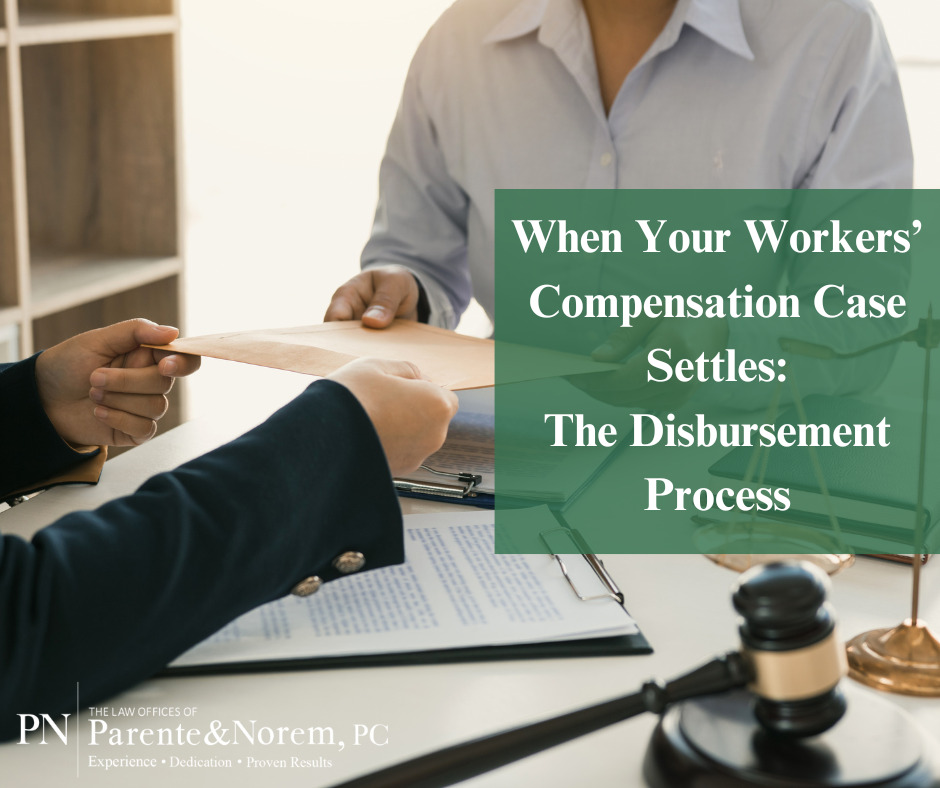
P&N BLOG | When Your Workers’ Compensation Case Settles – The Disbursement Process
After what can feel like a long process, the time has come for your workers’ compensation case to either win a verdict or reach a settlement. So now what? When dealing with a workers’ compensation case or any legal matter that involves a settlement, understanding the process can ease a lot of confusion.
At the Law Offices of Parente & Norem, P.C., we do everything we can to have your funds dispersed to you in a timely manner. The process is two-fold; there’s the final work your attorney needs to do to complete your file, as well as an operational component that ensures all guidelines have been followed in order to have your funds dispersed free and clear of any more ‘red tape.’ Here’s a detailed breakdown of what happens from the time of verdict/settlement to the final disbursement of funds.
The Attorney Process
Settlement Contracts
Once the settlement agreement is reached, the plaintiff’s attorney drafts a document called a settlement contract.
This document outlines the settlement terms, including the payment amount, any bills that will be paid from the settlement, and legal releases for the defendant from any further liability for the incident in question.By signing this document, the plaintiff agrees not to pursue any additional claims related to the same event.
Limited Power of Attorney
Once settlement documents are executed,the attorney provides a Limited Power of Attorney (LPOA) form to the client for their signature. This allows the attorney to deposit the settlement funds into the client’s trust account once received. It also permits the attorney to negotiate and resolve liens or outstanding medical bills related to the case, which helps maximize the client’s net recovery.
Settlement Fund Timeline
After all paperwork is signed and submitted, it typically takes 60-90 days for the settlement funds to be processed and sent to the plaintiff’s attorney.
The Operational Process
After the funds are deposited into the client trust account and all bills and liens are resolved, the attorney prepares a settlement disbursement packet, which includes a breakdown of the settlement amounts. This packet is passed to the operations or accounting team for processing.
Disbursement of Funds
Once all numbers align with the total settlement amount, checks are issued in the names of the client and any medical providers.
The client is invited to the attorney’s office for a final disbursement meeting, where they review the settlement breakdown, ask any questions, and sign the closing statement.
Final Steps
After signing the closing statement, the client authorizes the attorney to send checks to medical providers for their portion of the settlement. The client receives their net settlement check, which reflects the amount left after deductions for liens, legal fees, and other case-related expenses.
Once all payments are made, the case file is officially closed.
The settlement process can seem complex when your personal injury case is resolved, but with a knowledgeable attorney here at The Law Offices of Parente & Norem guiding you, it’s designed to protect your rights and maximize your recovery. From negotiating the terms of the release to ensuring every dollar is accounted for, this process ensures that you receive what you deserve while addressing any financial obligations tied to your case.
